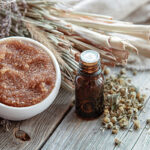The Best Herbs for Healing Insomnia Symptoms
Are you plagued by sleepless nights? Whether you’re struggling to fall asleep or wake frequently throughout the night, you might be desperate for relief. The pharmaceutical market is flooded with medications, both prescription and over-the-counter, designed to help you finally achieve the quality sleep you need. Unfortunately, some people are unable to take these medications for a variety of reasons or prefer a more holistic approach to healing. If this describes you, it may be time to consider herbal treatments for insomnia.
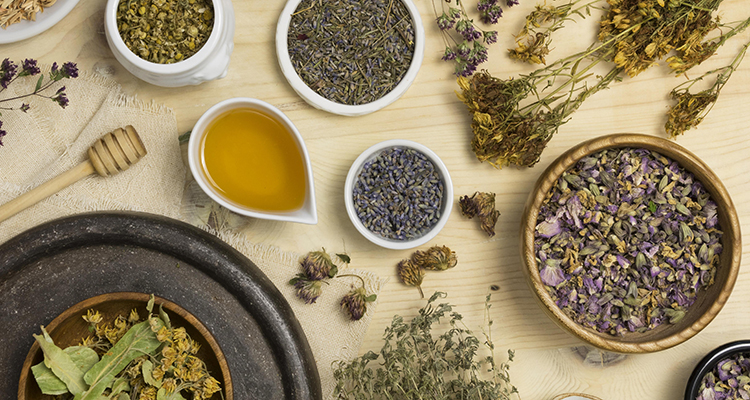
People have been using herbs for centuries to treat a myriad of ailments and improve overall health and wellbeing. In this article, we’ll take a closer look at what herbs promote sleep and help ease insomnia symptoms plus tips on how to consume them and the specific benefits of each.
Content
How Herbs Help Treat Insomnia
Most forms of insomnia are a result of something deeper. For example, anxiety, stress, and depression are some of the leading causes of insomnia. Stress affects how your brain produces serotonin, a neurotransmitter that controls happiness and calm. It also plays a role in relaxing your muscles and slowing your heart rate, two more factors that enhance sleep. By addressing these underlying mental conditions and balancing serotonin levels, you may also find relief for your insomnia. Medical conditions and environmental changes can also trigger insomnia, resulting in sleepless nights or difficulty falling and staying asleep.

Herbs offer a natural way of addressing what might be causing your insomnia while also promoting sleep. One of the major benefits of herbs for insomnia is that they rarely have side effects. Unlike prescription sleep aids that may negatively interact with your current medication or cause unpleasant side effects, most herbs work with your body to offer natural treatment for insomnia without any adverse effects.
Best Herbs for Insomnia
While most herbs for insomnia are designed to treat an underlying condition that may be causing your sleeplessness, each one offers its own unique benefits.
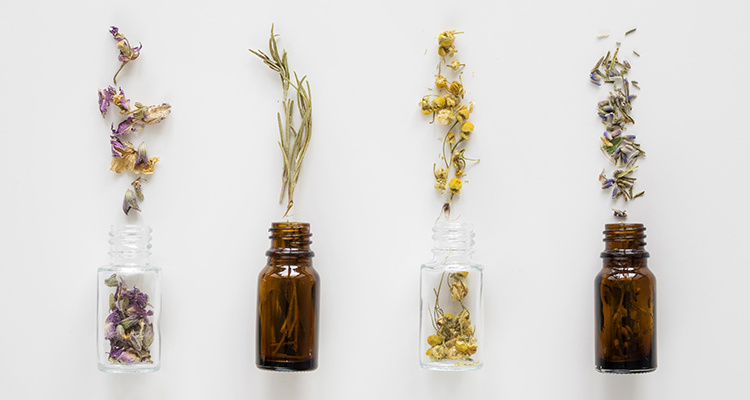
Valerian
Valerian root is one of the most popular herbs used to treat insomnia. Used since the 18th century, valerian root is also popular in perfumes and bath and body products. As a sleep aid, this herb promotes relaxation and may help reduce anxiety and restlessness. Valerian root inhibits the breakdown of a neurotransmitter known as GABA or gamma-aminobutyric which interacts with your body’s central nervous system, inhibiting nerve transmission. Studies show that this herb helps some people fall asleep faster and improves their sleep latency. This is the amount of time it takes for you to fall asleep after laying down.
Valerian root also contains specific antioxidants that have sedative, sleep-enhancing properties — specifically, linarin and hesperidin. These compounds work to inhibit activity in the brain’s amygdala, where fear, stress, and strong emotions are all processed. By doing so, users experience less anxiety and reduced stress, making it easier to fall asleep.
Chamomile
Chamomile is one of the most popular herbs used to promote sleep and relaxation. It’s commonly found in tea, making it easy and delicious to consume. Similar to valerian root, this daisy-like plant was once used in ancient herbal medicine to calm nerves. Not only does chamomile reduce anxiety but it may ease insomnia symptoms when used as part of a consistent sleep routine. The plant’s nerve-relaxing flavonoids offer sedative, tranquilizing benefits. Many users report feeling instantly at ease by merely inhaling the plant’s aroma.
Lavender
Lavender is the most well-known herb for promoting calm, relaxation, and overall well-being. It’s commonly used as a soothing scent during a massage and other spa treatments as well as soaps, perfumes, and body products. The fragrant plant not only induces sleep but can help your body rest.
In addition, lavender has sedative, antidepressant properties. Research shows that this herb can help relax your nerves, reduce anxiety, and stabilize certain mood disorders. An improved mood helps you feel more alert, focused, and awake during the day and also helps sustain longer sleep at night. Lavender is also credited for reducing the pain associated with migraines. If chronic headaches are causing your insomnia, this herb might help. Studies show that inhaling lavender is the best option for treating migraines. Users can inhale the oil directly or use an essential oil diffuser in the bedroom. A few drops on your pillow at night can also improve sleep quality.
Passionflower
Passionflower is a common herb found and used in North America for inducing sleep. Passionflower is also cultivated in Australia, Europe, Africa, and Asia. Like chamomile, passionflower contains nerve-relaxing flavonoids that work to reduce stress and anxiety while also promoting sleep. Unlike some other herbs used to treat insomnia, passionflower has a mild, pleasant taste.
Research shows that passionflower is most effective when used in combination with other herbs including hops and valerian. This herb is popular for helping calm nerves before surgery but may also treat ADHD (attention deficit-hyperactivity disorder), chronic pain, and insomnia. The major benefits of passionflower include increased sleep time, fewer instances of waking up during the night, and less time falling asleep.
Holy Basil
Another ancient herb, holy basil has been used for hundreds of years as a way to treat a myriad of health conditions from bronchitis and nausea to skin conditions and bug bites. It’s also effective at combating certain sleep disorders, including insomnia. Its main benefits for sleep include reduced stress and anxiety.
Holy basil contains adaptogens that are naturally found in your body. These compounds help you adapt and cope with stress. The adaptogens found in this natural herb help promote mental clarity and a balanced mood, helping prevent stressors that hinder sleep. Similar to lavender, holy basil is also credited with alleviating aches, pains, and other discomforts, especially those associated with back pain.
Ashwagandha
Ashwagandha is a medicinal herb known for helping combat insomnia symptoms, including improving onset latency and overall sleep quality. The strongest sleep-inducing compounds (triethylene glycol) are found in the leaves of the ashwagandha plant and work to reduce stress and anxiety. These compounds also induce calm and relaxation, helping users fall asleep faster. Like other herbs on this list, ashwagandha works as a sedative, making it a healthy and natural alternative to antidepressants and other anxiety medication.
Peppermint
Mint is good for more than just flavoring your tea and other foods. This popular herb and ingredient is a natural muscle relaxer used to ease pain and discomfort while also promoting sleep. By reducing built-up tension in your muscles, not only can users relax more at night but experience much-needed pain relief. This helps you find a more comfortable sleeping position faster and reduces the number of times you wake up during the night.
Studies show that mint is also effective at promoting healthy digestion. This can reduce nighttime bloating and other gastrointestinal issues. Similar to passionflower and chamomile, mint is one of the tastier herbs on this list, making it perfect in a hot cup of tea before bed. Another natural herb in the same family as mint is lemon balm. If you prefer a more citrus flavor but want the same benefits as mint, lemon balm is the perfect alternative.
St. John’s Wort
Not quite an herb, St. John’s wort is actually a very beneficial weed that grows in the wild. While this weed is dangerous for grazing cattle and other livestock, it offers a range of benefits for humans. Because of this, St. John’s wort is referred to as a weedy herb. The yellow flowers of this weed contain tryptophan, a chemical that not only induces sleep but also boosts serotonin synthesis. Increased serotonin levels help reduce stress and ease depression symptoms that may be causing your sleep troubles.
One thing to keep in mind when using St. John’s wort to treat insomnia is that it makes your skin sensitive to natural light. If you opt for topical oil, avoid exposing your skin to direct sunlight right after using it. On a side note, sleep therapy and exposure to daylight can actually promote sleep. Just be sure not to use these techniques in combination with St. John’s wort.
Hops
You’ve probably heard of hops in beer but this flower is also effective at easing insomnia symptoms and promoting sleep. Hops contain methylbutenol, a sleep-inducing chemical. First introduced in the early 1900s, doctors suggested patients place a sachet of powdered hops inside their pillowcases to help them fall and stay asleep. The flower’s strong aroma is said to elicit relaxation and promote quality sleep. On their own, hops are very bitter, which is why most people mix them with chamomile or peppermint tea for easier digestion.
Wild Lettuce
Wild lettuce, also known as bitter lettuce, can promote healthy digestion as well as sleep. The leaves of this lettuce contain a milky fluid known as lactucarium that has sedative and analgesic properties. When consumed in moderation, wild lettuce can help reduce pain, soothe your nerves, and ease insomnia symptoms. Some users ingest wild lettuce to help treat depression and anxiety. This natural herb is popular in homeopathic medicine. The side effects are so mild that this herb is sometimes used to promote sleep in children.
California Poppy
Poppy seeds from the poppy plant contain negligible amounts of opiates, which is one reason the California poppy plant also has sedative properties and is popular in alternative medicine. California poppy is an ornamental plant native to Mexico and the United States. Its main use is for relieving pain thanks to its analgesic properties. Since chronic pain is a leading cause of sleep disturbances, California poppy might deliver much-needed relief.
Some users steep the plant’s bright orange leaves in tea or use it topically by rubbing poppy-infused oil directly on their skin, muscles, and joints. Ingesting tea offers mild benefits as it moves through your digestive system whereas rubbing the oil on your skin provides a stronger effect as the herb is absorbed directly into your body.
How to Use Herbs for Sleep
There are several ways and methods for using herbs to treat and ease insomnia symptoms. Depending on the type of herb and the desired effects, certain methods may work better than others. Here are a few tips for using these herbs to promote sleep and get the most benefits.
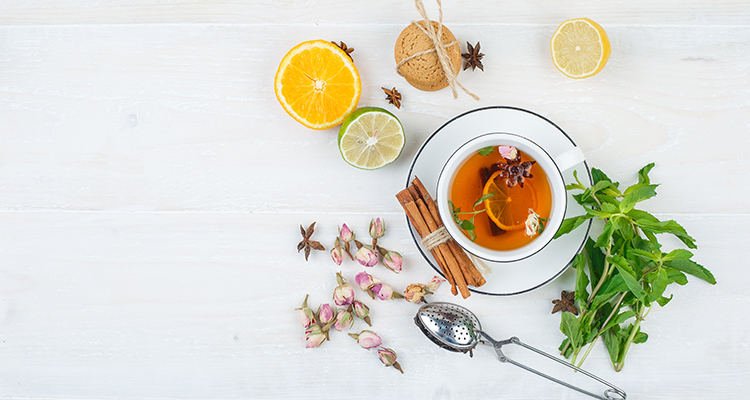
Brew Tea
This is the most popular way to ingest beneficial herbs like chamomile, lavender, peppermint, and countless others. Not only are most teas brewed with a pleasant taste but drinking a soothing cup of tea at night is a great addition to your sleep routine (more on this later).
Add 1 teaspoon of your favorite herbal tea flavor to a cup of boiling water and let it steep for 15 – 20 minutes. Strain and remove the leaves before drinking. You can add a small bit of honey for added sweetness. Some studies show that honey may actually improve sleep quality as well. Drink 2 to 3 cups of herbal tea a day to promote overall well-being, less stress, and better sleep.
Use Essential Oils
Many herbs for insomnia also come in the form of essential oil. There are a variety of ways you can use essential oils for sleep including adding them to your tea or bath water, placing a few drops on your skin or pillow, or using an essential oil diffuser. You can also add a few drops of oil to a pot of boiling water and inhale the steam. Floral fragrances like lavender and passionflower are popular choices for promoting relaxation and relieving stress before bed.
Applying these oils to your skin not only offers the benefit of their aroma but may have topical medicinal benefits as well. For example, peppermint and California poppy are said to rescue muscle tension, aches, and pains. Rub a small amount of these essential oils into your skin before bed to enjoy pain relief and calming benefits. Try mixing these oils with olive, coconut, or grapeseed oil before rubbing it on your neck, chest, wrist, forehead, hands, or feet to prevent an allergic reaction or skin irritation.
Consume Herbal Extract Supplements
If you prefer a quick and easy way to consume beneficial herbs for insomnia, a supplement might be your best option. Most herbal extract supplements are available in capsule form. These are sold over-the-counter at most pharmacies and online. Be sure to read the dosage instructions and all active ingredients before adding a supplement to your daily regime. If you’re currently taking other medications to treat certain health conditions, confer with a medical professional before consuming an herbal supplement.
Tips for Incorporating Herbs Into Your Sleep Routine
We’ve already covered the many benefits of herbs for insomnia but you may still be wondering the best way to incorporate these natural remedies into your daily routine. By making a few minor adjustments to both your daily and nightly routine, you can easily enjoy the benefits of these natural herbs including reduced stress and anxiety, a more balanced mood, and better sleep.
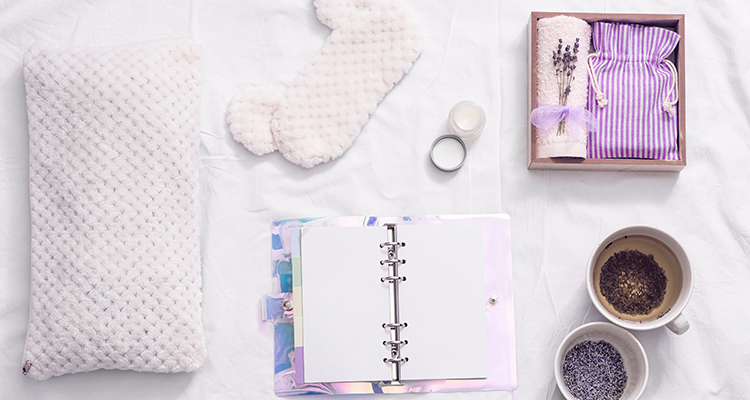
Adopt a Sleep Routine
As humans, we thrive on routine. By establishing a consistent sleep routine and schedule, you can help train your body and brain to sleep better and longer. Your sleep routine should include relaxing behaviors at least 2 hours before bed and eliminate any unhealthy behaviors that might interfere with your sleep patterns. Things like watching television or scrolling through social media can prevent your brain from releasing melatonin, a hormone that induces sleep.
Instead of performing these activities, try writing in a journal, reading a book, or meditating. Drinking one of the abovementioned herbal teas should also be part of your sleep routine. Not only will a hot cup of tea signal that it’s time to prepare for sleep, but the healing benefits can reduce stress, relieve pain, and promote relaxation. Try performing these behaviors around the same time each night. By going to sleep and getting up at the same time, you’re helping balance your body’s circadian rhythm, which can improve sleep quality and help you wake feeling more rested and energized.
Create an Oasis for Sleep
Where you sleep is just as important as when. Your bedroom should be an oasis for sleep. That means creating a relaxing, welcoming environment free of distractions or stimulants. Start by only using your bed for sleep and sex. That means no eating, working, or watching TV in bed. This helps strengthen the connection between your brain and mind that your bed is meant for sleep and not to be awake. You can also support this connection by not lying awake in bed for longer than 15 or 20 minutes.
Invest in room darkening shades or a sleep mask to reduce light disturbances. A noise machine and other forms of white noise can help eliminate other distractions and outside interference. An essential oil diffuser will disperse the herbal fragrance of your choice throughout the bedroom, while also promoting relaxation and sleep. You can also place a few drops of oil on your pillowcase and sheets to inhale the calming aroma.
Reduce Stress and Anxiety
Extreme stress and anxiety can make it difficult to fall and stay asleep at night. They can also cause a variety of health complications including high blood pressure, headaches, diabetes, heart disease, obesity, and increased depression. By reducing your stress and anxiety, you can benefit your overall health and reduce insomnia symptoms.
Exercise is a great way to reduce stress and improve your mood. Physical activity also promotes sleep by making you more tired at night. You can also maintain a healthy weight and ward-off obesity by adopting a regular exercise routine. Promote healthy digestion by taking a peppermint herbal supplement, drinking herbal tea, or adding a few drops of mint oil to your water during a workout. Use essential oils topically to reduce muscle pain and discomfort while also promoting relaxation and mental clarity. Meditation is another great way to calm your nerves and reduce negative thoughts and feelings, making it easier to fall asleep at night.
Herbs as a Natural Way to Ease Insomnia Symptoms
Are you looking for a natural way to treat your insomnia without any unwanted side effects? Herbs and herbal supplements may offer the relief you so desperately need without causing additional complications. From reducing pain and stress to promoting relaxation, there are countless herbs available to help you finally get the quality sleep you need and deserve.
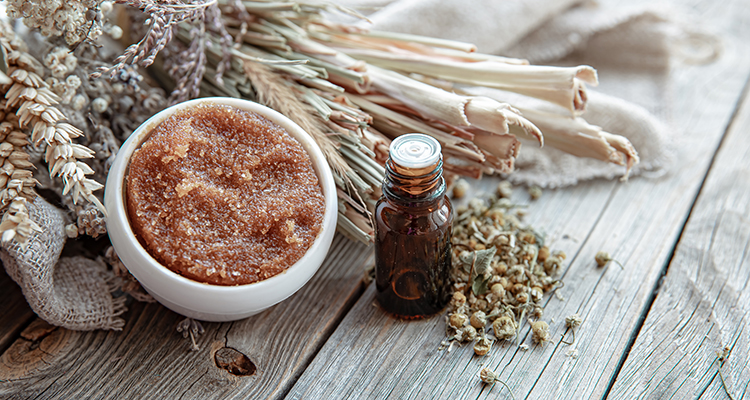
In addition to adopting healthy sleep routines that include these beneficial herbs, online treatment programs like Somnus Therapy can offer valuable tools and resources. Using a combination of CBT for insomnia (CBT-i), Acceptance and Commitment Therapy for Insomnia (ACT-i) and other therapies, we help patients understand and accept their condition and while also finding the best approach for their unique needs.





